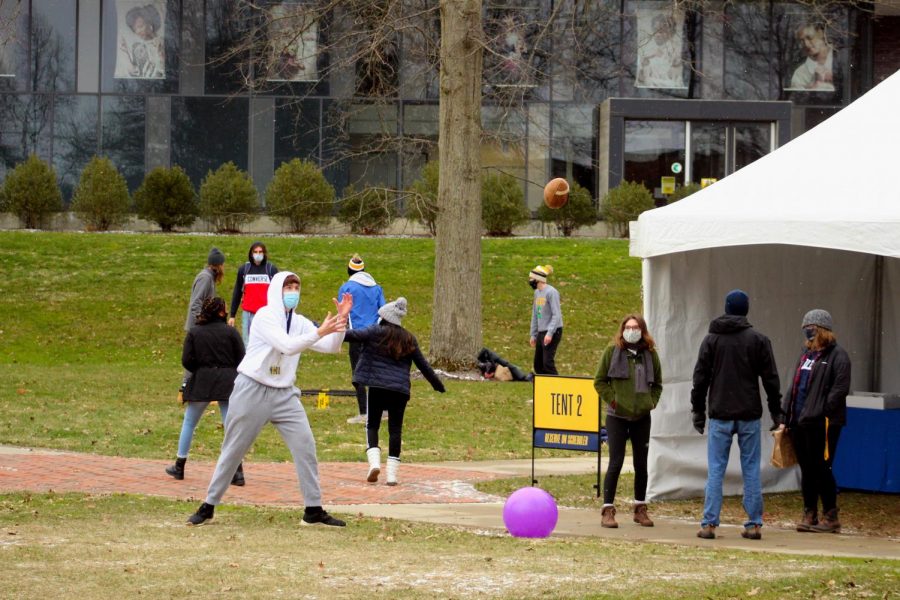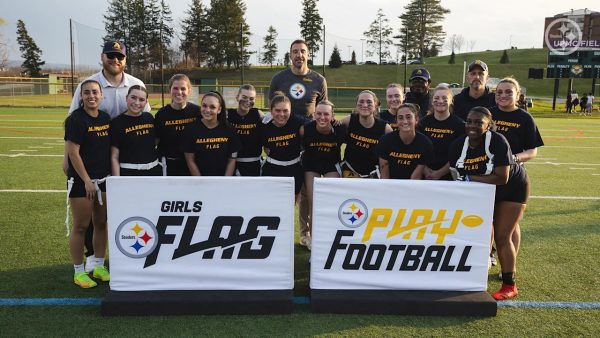ASG, students prepare for reopening with an eye on delta variant
Students participate in the Midwinter Festival, put on by the Office of Spiritual and Religious Life (SRL) on March 12, 2021. Despite temperatures in mid-40s to low-50s, the event had to be held outside with masks and social distancing due to COVID-19 public health restrictions.
In an email to students July 23, the Allegheny College Health Agency announced a new pandemic plan for the 2021-22 school year in which the administration plans to fully reopen the college. According to the plan, detailed on the college website, vaccinated students will no longer be required to mask or socially distance for most campus activities, while those who are unvaccinated will still be required to mask, distance and undergo weekly testing. The move comes after two semesters of regular surveillance testing, mandatory masking and social distancing.
Allegheny Student Government President Noah Tart, ’22, is optimistic that the upcoming year will see a return to a more normal Allegheny experience.
“Hopefully with all the students being vaccinated we are able to keep (rates of) COVID-19 (infections) low and get back into more social interaction,” Tart said. “In the past, we were burned with social isolation, but now we have the opportunity to come back to community, which is one of the higher-valued aspects of the college.
ASG Vice President Sophie Adams, ’22, is also looking forward to seeing more student events as restrictions relax.
“It will be nice to see clubs using their club budgets,” Adams said. “Even the budgets they did have last year weren’t used because we couldn’t really do events. I’m looking forward to seeing students using the money that they pay for (through the Student Activities Fee).”
But Tart also noted that the Delta variant of the COVID-19 is on the rise in the United States. The variant, which, according to the New Yorker, is twice as contagious as the original COVID-19 strain, has prompted the CDC to recommend even fully vaccinated people mask in certain situations.
“This variant is not very shy,” Tart said. “Where we’re going to be, November to January, is peak flu season. If that means for those couple months we enact a mask mandate and then take it back later when it gets a little bit warmer, past flu season, I think that’s a bullet we need to be able to bite as a student body.”
Despite the sharp uptick in cases, both students and parents feel comfortable with the fall return to campus. According to an Instagram poll conducted by The Campus between July 31 and August 1, 84 of 99 student respondents, almost 85%, said that they feel comfortable returning to campus with current restrictions. 30 of 36 parent respondents, or around 83%, said they feel comfortable sending their children back to campus.
Adams said that she personally has continued to mask, even after getting fully vaccinated.
“I think it’s the logical and the safe thing to do, and I really don’t think it’s that difficult if it means we’re able to do all of the other things we weren’t able to do for the last year,” Adams said. “If it means we can eat together, if it means we can have families on campus for performances, if it means athletes can travel, if it means clubs can have more people at their events during the cold months when we can’t meet outside, if it means we can do all of those things, then I think it’s a small price to pay.”
Adams is not alone. According to that same Instagram poll conducted by The Campus, just over half of student respondents, 54%, are planning on regularly masking upon returning to campus.
Both Tart and Adams said that ASG would push the administration to reinstate safety guidelines should rates of infection spike. The student body, however, is not as unified. According to that same poll, 49 of 91 respondents, around 54%, said that the ACHA should reinstate masking and distancing in light of the new Delta variant, with some respondents tempering even that response by suggesting that students mask, but not distance.
On August 6, the ACHA updated its pandemic plan with stricter guidelines for off-campus travel, recommended masking in off-campus indoor public spaces, and increased testing protocols. However, the Agency stopped short of reimposing masking for all community members, citing a low rate of serious disease amongst the vaccinated, a 99% student vaccination rate and a 94% faculty vaccination rate.
“These vaccination rates will significantly lower the risk of infection,” the ACHA wrote. “Our arrival testing plan also ensures that we begin the semester with all community members tested. And, our pandemic plan restricts the interaction of students and employees with unvaccinated visitors.
Within the classroom, Kiley Hewitt, ’22, thinks that professors should have final say in health guidelines.
“I think masking in class should be left to (the) professor’s discretion, because some of them have little kids that won’t be able to be vaccinated, at least at the start of the semester,” Hewitt wrote in response to the polls. “Some of (the professors) are just a lot older and higher risk than most of us are.”
Adams reiterated that any reimposition of COVID-19 mitigations measures would be made to protect students.
“If we have to restrict what we are able to do, I think students need to understand that it’s in the best interest of their safety and we’re all here to keep each other safe,” Adams said
Beyond the physical impact of the pandemic lie the effects of mitigation measures on students’ mental health. Tart noted that ASG was working with dean of students April Thompson on safe and interactive programming to rebuild Allegheny’s sense of community.
“We’re developing some programs that have been very successful in the past to lay some groundwork of community,” Tart said. “We’ll have the Involvement Fair, which is planned for the 26th of August, which is an opportunity for clubs to all come together and offer an outlet for students who want to find their niche …Then we’ll slowly integrate our more normal fall events such as Wingfest.”
Tart hopes that ASG’s weekly General Assembly, held on Tuesday evenings in the Campus Center, can return to normal in the fall.
“If we could be maskless, I think that’s the plan, that would be beautiful, but it’s going to come down to what’s safe,” Tart said. “If that means wearing another cloth on our face for one hour a week, just to keep our whole community safe, I think that’s a social responsibility that if people who are elected to positions that represent students they need to be able to enact social responsibility.”
Tart also invited students who have concerns or confusions to speak to him and Adams.
“We would be more than happy to sit and meet and go over these things that are going to be very important going into the fall.”
In all, Tart said a nuanced and well-considered set of guidelines would be needed.
“Let’s be optimistic for what we can do, but let’s be realistic for what the situation (is) that’s around us,” Tart said.
The ACHA did not respond to multiple requests for comment.

Sami Mirza is a senior from many different places. He is majoring in International Studies with a focus on the Middle East and North Africa and minor in...









